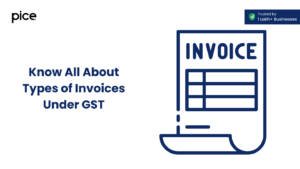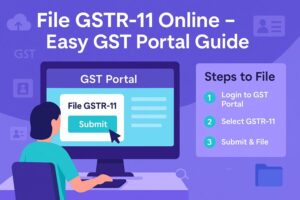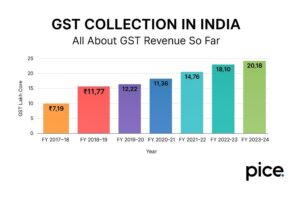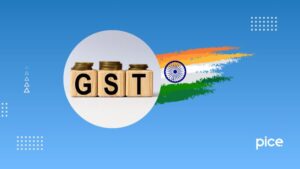Issue of Refund Voucher Under GST for Advance Payment
- 18 Aug 25
- 9 mins
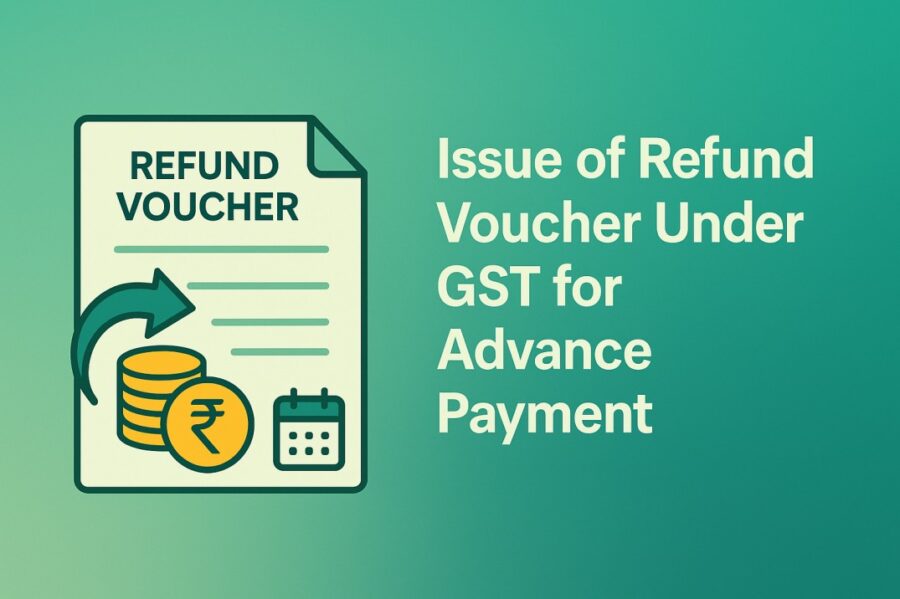
Issue of Refund Voucher Under GST for Advance Payment
Key Takeaways
- A refund voucher in GST is issued when advance payments are returned due to cancelled supply of goods or services.
- GST refund voucher rules are defined under Section 31(3)(e) of the CGST Act and Rule 51 of CGST Rules.
- Refund vouchers must include supplier details, GSTIN, refund amount, tax rate, and receipt voucher reference.
- GST refund vouchers are reported in GSTR-1 (Table 11 Part II) and adjusted in GSTR-3B returns.
- Issuing a GST-compliant refund voucher ensures transparency, legal compliance, and accurate tax records.
Traders/manufacturers may request a specific amount in advance, in the case of bulk delivery of goods. In most cases, service providers ask for advance payments, prior to completing the service delivery.
Predictably, there is a degree of ambiguity felt among people surrounding the concept of a refund voucher under GST, that is to be issued in case of advance payments. The expected treatment in the case of unforeseen withdrawal of service/delivery of goods is a concerning matter.
Learn more about the refund voucher under GST in this blog to make informed decisions under applicable circumstances.
What is a Refund Voucher in GST?
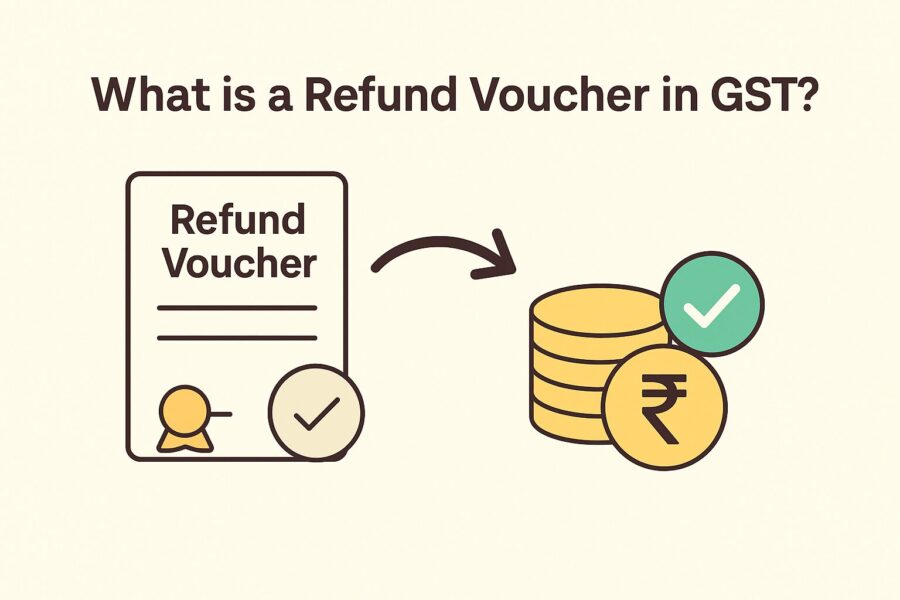
A refund voucher is essentially a document that is issued by the supplier of goods/services or both to the recipient of the same, at the time of refund of any advance money previously extended by the customer. This refund voucher must be issued to nullify the impact of the 'Receipt Voucher’, issued when the supplier accepted the advance payment earlier for the supply of goods/services or both; but the same could not be delivered due to some reason.
The refund voucher must be issued in accordance with clause (e) of the CGST Act, 2017, section 31(3). Prompted particulars should be provided in the refund voucher, as prescribed under CGST Rules (Rule 51 in particular).
Advance Paid Against Goods or Services
A bulk order may be accepted by the manufacturer alongside an advance for the order. In such a case, manufacturers would be required to issue a receipt voucher as they receive the advance. In case the order is cancelled afterwards without notice, there shall be no tax invoice issued. The manufacturer would be responsible for issuing a refund voucher for the advance he had previously accepted.
If a circumstance results where the order for a service is cancelled post-payment of an advance, the service provider shall have to issue a refund voucher to the individual who had previously made the payment.
Consider the following examples for a better understanding:
Example 1
● A furniture company got an order for 100 chairs, with each individual chair costing Rs. 1,000 from an enterprise, for their new office. The enterprise handed over an advance of Rs. 30,000 for said chairs.
However, the order was later cancelled by the enterprise. In such a case, the furniture company would be required to issue a 'receipt voucher' upon the receipt of the advance as well as a 'refund voucher' at the cancellation time for the order, under GST.
Example 2
● A Courier Service company received the instruction to courier a package to Kerala from an enterprise, for Rs 50,000. The enterprise had paid an advance of Rs 25,000 for said courier. Afterwards, the enterprise withdrew the order owing to delays caused by the courier service company.
In such a case, the courier company would have to issue the refund voucher at the withdrawal time of the order alongside a receipt voucher at the receipt of advance, under the GST Act.
Details Required in the Refund Voucher as per GST Rules
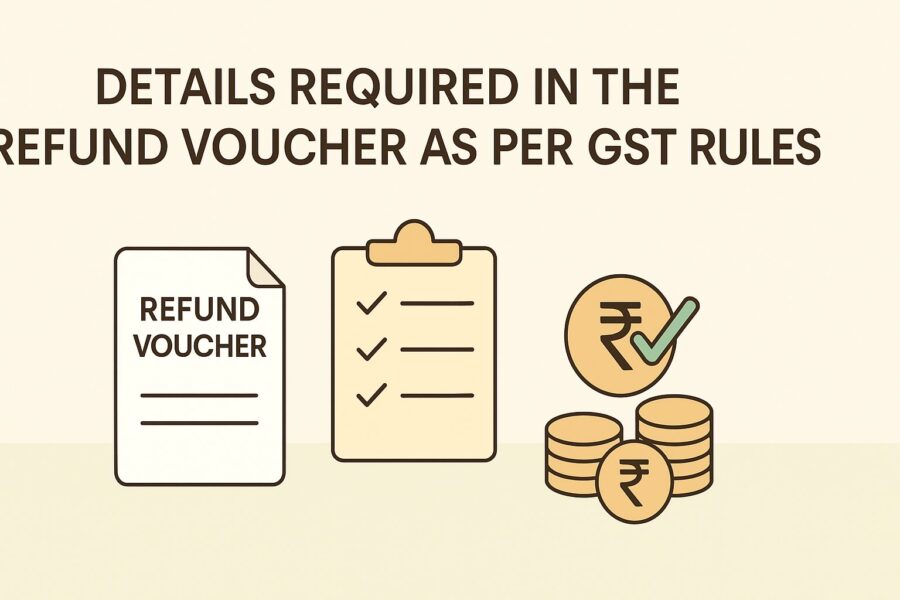
The following details must be mentioned in the refund voucher according to the established GST rules:
● Name, address as well as the GSTIN of the respective seller of goods/service provider
● A serial number which does not exceed 16 characters, (unique for the specific financial year)
● Refund voucher date of issue
● Name, address as well as GSTIN/UIN of the goods/services receiver, as registered under GST in India
● Number as well as the receipt voucher issue date
● Description of the goods/services sold for which the refund is being made
● The amount of the applicable refund
● The rate of tax under CGST, SGST/UTGST, IGST/cess
● The tax amount paid under CGST, SGST/UTGST, IGST/cess in regards to the goods or services (for which refund is being made).
● Tax is paid on the reverse charge basis or along a normal course
● Supplier’s/authorised representative’s signature or their digital signature
Note that the signature/digital signature is not required if the refund voucher is issued digitally.
Receipt Voucher Generation
When one is issuing a GST voucher, it's important to make note of all the necessary details to ensure validity under GST in India. The voucher should contain pivotal information, including details about the amount being refunded/appropriate tax information.
To streamline the entire process, one can utilise the GST software that enables them to generate a compliant special voucher consisting of all the relevant details. This shall help reduce errors, ensure adherence to GST laws, and facilitate a seamless refund process.
By generating a valid refund voucher, one can keep accurate records while avoiding potential issues with tax officials.
What is the Treatment of Refund Vouchers in the Context of GST Returns?
Here is an overall idea about the treatment of refund vouchers in the context of GST returns:
● The refund amount will be displayed in GSTR-1, falling under Table 11 part II (i.e. “amendment of details as to advances received/advance adjusted furnished in tax periods prior.”)
● During GSTR-3B filing, adjustments shall be initiated in the advance amount as received, upon which the GST is already paid. Only the net amount will be reflected in Table 3.1(a) (“outward taxable supplies”).
Points to Keep in Mind in Regards to Refund Vouchers
1. According to the proviso to Rule 50, given that, at the time of the supplier accepting the advance amount:
- If the tax rate is not determinable, GST must be paid at the 18% rate.
- In case the nature of the supply is not established, the supply will be treated as an 'inter-state supply'; GST must be paid as per the same conclusion.
2. Once the advance payment is received, yet the supply is not made, the supplier shall have to refund the advance amount, as a result. A 'refund voucher' must be issued under such circumstances (if a tax invoice is not issued).
Note that if a tax invoice has been issued, subsequently, the credit note shall have to be issued to balance out the transaction made.
3. A composition dealer will not have to pay GST on advances received, but this rests upon the condition that such advances relate to their 'outward supplies'.
Conclusion
In conclusion, the refund voucher under GST is an important document issued by a registered individual to a customer in case a refund is to be made for advance payments that weren't adjusted against supplies. According to the CGST Act Section 31(3)(e) and Rule 51 of CGST Rules, a 'refund voucher' acts as a 'proof of refund'. It can be utilised by the consumer.
This document plays a vital role in retaining transparency and accountability through GST transactions when advances are specifically involved.
By issuing the refund voucher, businesses shall be able to ensure compliance with GST laws and offer a clear audit trail for any refunds made to consumers.
💡If you want to streamline your payment and make GST payments via credit card, consider using the PICE App. Explore the PICE App today and take your business to new heights.
 By
By 






